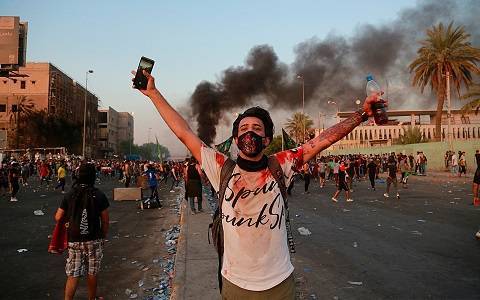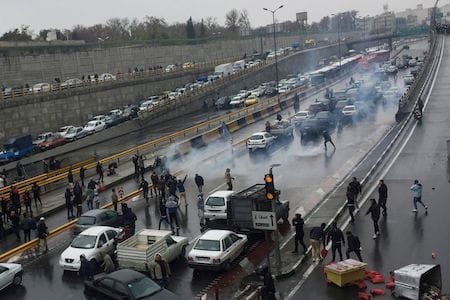 Donald Trump’s latest post on his account, in which he presents his vision to transform and reconstruct Gaza into a Riviera by displacing 2.1 million Palestinians, absurd as it may seem, unravels two distinct assumptions: first, it is merely an indifferent contribution to a puzzling situation that has remained unresolved since the beginning of the previous century; and second, it is yet another proposition that excludes one of the key variables in the equation: the Palestinians.
Donald Trump’s latest post on his account, in which he presents his vision to transform and reconstruct Gaza into a Riviera by displacing 2.1 million Palestinians, absurd as it may seem, unravels two distinct assumptions: first, it is merely an indifferent contribution to a puzzling situation that has remained unresolved since the beginning of the previous century; and second, it is yet another proposition that excludes one of the key variables in the equation: the Palestinians.

On October 7, 2023, President Biden declared his administration’s “rock-solid and unwavering support” to Israel. More than nine months into the Gaza war, his adherence to his initial promise is unquestionable. This article will examine US foreign policy vis-à-vis the war on Gaza, focusing on its prospective objectives and its implications on domestic, regional, and international levels. It will also argue that American foreign policy on the issue is primarily reactive rather than proactive.
 Today's era is characterized by constant rearrangements and changes, which have always happened in the past as this is a natural progression of events. However, now it seems to have acquired a reckless speed of change similar to that of the development of technology, which is undoubtedly judged as one of the most important game changers of international reality. The ambiguity and multipolarity that characterizes contemporary events and international developments tend to become a constant among the maze of variables, making it increasingly difficult to properly and qualitatively analyze and design an effective plan of action at the nation-state level.
Today's era is characterized by constant rearrangements and changes, which have always happened in the past as this is a natural progression of events. However, now it seems to have acquired a reckless speed of change similar to that of the development of technology, which is undoubtedly judged as one of the most important game changers of international reality. The ambiguity and multipolarity that characterizes contemporary events and international developments tend to become a constant among the maze of variables, making it increasingly difficult to properly and qualitatively analyze and design an effective plan of action at the nation-state level.
 As the Russian invasion of Ukraine continues in full gear, contrary to the steadfast reactions of the western world, the regional responses from the Middle East paint a different picture. Having initially been caught off-guard with the intensifying tag between Russia and the west, most ‘heavyweight’ MENA countries have adopted a ‘sit tight and assess’ approach. Longstanding partners of the west are balancing their reactions in order to minimize the risks stemming from overtly picking sides in a conflict that they increasingly see as not their own. On the region’s eastern flank, Iran too, walks a thin line.
As the Russian invasion of Ukraine continues in full gear, contrary to the steadfast reactions of the western world, the regional responses from the Middle East paint a different picture. Having initially been caught off-guard with the intensifying tag between Russia and the west, most ‘heavyweight’ MENA countries have adopted a ‘sit tight and assess’ approach. Longstanding partners of the west are balancing their reactions in order to minimize the risks stemming from overtly picking sides in a conflict that they increasingly see as not their own. On the region’s eastern flank, Iran too, walks a thin line.
 This analysis aims at underlining the economic and political crisis in Iraq that led to widespread protests around the country since October 2019. The government’s inability to deliver basic services to society has created a series of protests with demands for better living conditions. The Iraqi security forces and armed militias are using extreme force to tackle the demonstrations with many protesters injured or killed. Hence, the question that presents itself is how foreign interventionism affects the country’s society and sense of security, as well as its economy.
This analysis aims at underlining the economic and political crisis in Iraq that led to widespread protests around the country since October 2019. The government’s inability to deliver basic services to society has created a series of protests with demands for better living conditions. The Iraqi security forces and armed militias are using extreme force to tackle the demonstrations with many protesters injured or killed. Hence, the question that presents itself is how foreign interventionism affects the country’s society and sense of security, as well as its economy.
 Recently, Israel has improved its relations with the Gulf. This development was formalized via the Abraham Accords with the United Arab Emirates (UAE) and Bahrain and the silent approval of Saudi Arabia. The normalization between Israel and the Gulf is the result of a process some 20 years in the making, as 27 years have passed since Rabin, Arafat and Clinton signed the Oslo Declaration of Principles, which for the most part is now inactive. The questions that arise are how these accords can potentially affect the regional balance and whether more accords are likely to come.
Recently, Israel has improved its relations with the Gulf. This development was formalized via the Abraham Accords with the United Arab Emirates (UAE) and Bahrain and the silent approval of Saudi Arabia. The normalization between Israel and the Gulf is the result of a process some 20 years in the making, as 27 years have passed since Rabin, Arafat and Clinton signed the Oslo Declaration of Principles, which for the most part is now inactive. The questions that arise are how these accords can potentially affect the regional balance and whether more accords are likely to come.
 Famed for its charitable non-profit work in war-torn and poverty-stricken parts of the world, the Aga Khan Development Network funds, amongst others, a plethora of cultural initiatives coordinated under the umbrella of the Aga Khan Trust for Culture. Albeit guided by Islamic ethics and a focus on redeveloping cultural heritage in areas with Muslim populations, the organization brings together financial and technical resources to revitalize local communities regardless of their faith, and build cultural bridges between the Islamic and non-Islamic world.
Famed for its charitable non-profit work in war-torn and poverty-stricken parts of the world, the Aga Khan Development Network funds, amongst others, a plethora of cultural initiatives coordinated under the umbrella of the Aga Khan Trust for Culture. Albeit guided by Islamic ethics and a focus on redeveloping cultural heritage in areas with Muslim populations, the organization brings together financial and technical resources to revitalize local communities regardless of their faith, and build cultural bridges between the Islamic and non-Islamic world.
 During the past few weeks, it seems that the killing of General Qasem Soleimani, the head of the Islamic Revolutionary Guard Corps (IRGC), on January 3, 2020, should have sent Middle Eastern relations and the fragile regional equilibrium into a spiral. Nonetheless, the repercussions of the US administration’s decision have not yet been observed on a larger international scale, but rather on the domestic one.
During the past few weeks, it seems that the killing of General Qasem Soleimani, the head of the Islamic Revolutionary Guard Corps (IRGC), on January 3, 2020, should have sent Middle Eastern relations and the fragile regional equilibrium into a spiral. Nonetheless, the repercussions of the US administration’s decision have not yet been observed on a larger international scale, but rather on the domestic one.
Το Κέντρο Μεσογειακών,Μεσανατολικών και Ισλαμικών Σπουδών φιλοξενεί πληθώρα διαφορετικών απόψεων στα πλαίσια του ελεύθερου ακαδημαϊκού διαλόγου. Οι απόψεις αυτές δεν αντανακλούν υποχρεωτικά τις απόψεις του Κέντρου. Η χρήση και αναπαραγωγή οπτικοακουστικού υλικού για τις ανάγκες της ιστοσελίδας του ΚΕΜΜΙΣ γίνεται για ενημερωτικούς, ακαδημαϊκούς και μη κερδοσκοπικούς σκοπούς κατά τα προβλεπόμενα του Νόμου 2121/1993 (ΦΕΚ Α' 25/4-3-1993) περί της προστασίας της πνευματικής ιδιοκτησίας, καθώς και του άρ.8 του Νόμου 2557/1997 (ΦΕΚ Α' 271/1997).

